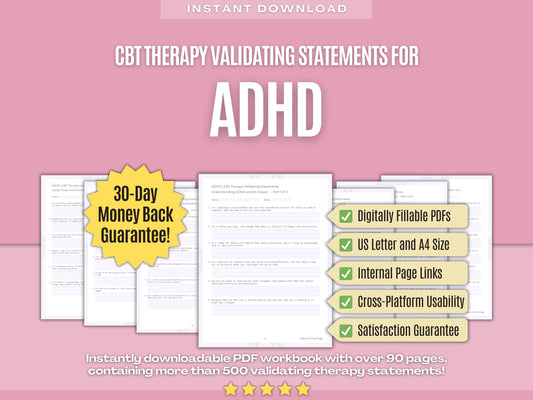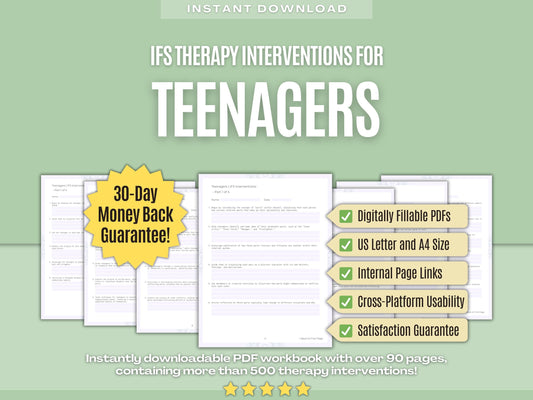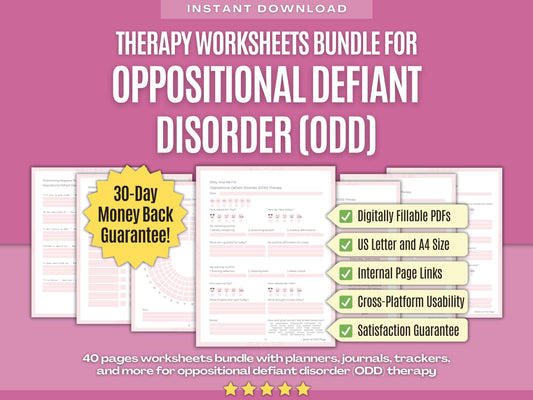Elevate Your Therapy and Guide Your Clients to Inner Healing with Our Adolescents Coping Skills! ✨
1. Building Self-Esteem
- Practice self-affirmations by repeating positive statements about yourself, such as "I am capable," "I am worthy," and "I am lovable."
- Challenge negative self-talk by questioning its validity and replacing it with more realistic and compassionate thoughts.
- Surround yourself with supportive and encouraging people who appreciate you for who you are.
- Take care of your physical health by getting regular exercise, eating nutritious foods, and getting enough sleep.
- Learn to accept compliments gracefully instead of dismissing or downplaying them.
- Avoid comparing yourself to others, recognizing that everyone has their own unique journey and strengths.
- Seek out opportunities for personal growth and learning, whether it's through education, hobbies, or new experiences.
- Challenge perfectionism by embracing imperfection and learning from mistakes instead of being overly critical of yourself.
- Celebrate your successes and achievements, no matter how small, and give yourself credit for your efforts.
- Practice gratitude by reflecting on the things in your life that you're thankful for, no matter how small.
- Seek out opportunities to contribute to your community or make a difference in the lives of others, boosting your sense of purpose and self-worth.
Need more? Find all 500+ Coping Skills for Adolescents Therapy in our Digital Workbook!
2. Managing Stress Effectively
- Practice deep breathing exercises to activate the body's relaxation response and reduce feelings of stress.
- Prioritize tasks and responsibilities to manage time effectively and prevent feeling overwhelmed by a heavy workload.
- Practice mindfulness techniques, such as meditation or body scans, to cultivate awareness of the present moment and reduce anxiety about the future.
- Identify and challenge negative thought patterns that contribute to feelings of stress and anxiety, replacing them with more positive and realistic perspectives.
- Limit exposure to stressors, such as excessive screen time or negative news, and create boundaries to protect your mental health.
- Develop healthy coping mechanisms, such as journaling, drawing, or listening to music, to express and process emotions in a constructive way.
- Set realistic expectations for yourself and others, recognizing that it's okay to ask for help or say no when you need to.
- Take regular breaks throughout the day to rest and recharge, avoiding burnout and fatigue.
- Use problem-solving skills to address challenges and obstacles proactively, rather than becoming overwhelmed by them.
- Create a supportive environment at home or work by surrounding yourself with positive influences and minimizing exposure to negativity.
- Develop a support network of trusted individuals who you can turn to for guidance, advice, and emotional support during times of stress.
Need more? Find all 500+ Coping Skills for Adolescents Therapy in our Digital Workbook!
3. Developing Healthy Relationships
- Practice active listening skills to show others that you value and respect their thoughts and feelings.
- Show empathy and compassion towards others by putting yourself in their shoes and trying to understand their perspective.
- Set healthy boundaries in relationships to protect your emotional well-being and ensure mutual respect and understanding.
- Practice forgiveness and let go of grudges or resentment towards others, freeing yourself from negative emotions and promoting healing in relationships.
- Prioritize quality time with loved ones by spending meaningful moments together and creating lasting memories.
- Practice assertiveness by advocating for your needs and expressing your opinions and feelings confidently, without being passive or aggressive.
- Seek out role models or mentors who demonstrate healthy relationship behaviors and provide guidance and support.
- Avoid toxic or unhealthy relationships that undermine your self-worth, happiness, and well-being.
- Set goals for personal growth and development within relationships, such as improving communication skills or building intimacy and trust.
- Practice conflict management skills, such as active listening, compromise, and problem-solving, to navigate disagreements and challenges in relationships.
- Cultivate self-love and acceptance by recognizing your own worth and value, independent of others' opinions or approval.
Need more? Find all 500+ Coping Skills for Adolescents Therapy in our Digital Workbook!
4. Navigating Social Media Wisely
- Set boundaries for your social media use, such as limiting screen time or establishing specific times of day for checking notifications.
- Cultivate a healthy self-image by recognizing that social media often presents a curated and unrealistic portrayal of people's lives.
- Engage in activities outside of social media, such as hobbies, exercise, or spending time with friends in person, to reduce reliance on online platforms for validation and entertainment.
- Practice empathy and kindness towards others online, recognizing that everyone has their own struggles and vulnerabilities.
- Take regular breaks from social media to recharge and reconnect with the offline world, allowing yourself time to relax and rejuvenate away from screens.
- Practice self-care activities, such as meditation, journaling, or spending time in nature, to manage stress and anxiety related to social media use.
- Seek support from trusted friends, family members, or mental health professionals if you're struggling with negative feelings or behaviors related to social media.
- Educate yourself about the potential risks and dangers of social media, such as cyberbullying, online predators, or addictive behaviors, and take steps to protect yourself.
- Develop healthy coping mechanisms for dealing with stress, boredom, or loneliness that don't involve turning to social media for distraction or validation.
- Foster a sense of gratitude and appreciation for the positive aspects of social media, such as staying connected with distant friends or accessing valuable resources and information.
- Practice assertiveness skills to set boundaries with friends or peers who pressure you to engage in unhealthy or risky behaviors online.
Need more? Find all 500+ Coping Skills for Adolescents Therapy in our Digital Workbook!
5. Handling Academic Pressure
- Break tasks into smaller, more manageable steps to make studying and completing assignments feel less overwhelming and more achievable.
- Set realistic goals for yourself academically, recognizing your strengths and limitations, and aiming for progress rather than perfection.
- Seek support from teachers, tutors, or classmates if you're struggling with understanding material or completing assignments, rather than trying to handle academic challenges alone.
- Practice mindfulness techniques, such as deep breathing or meditation, to stay present and focused while studying, reducing distractions and improving concentration.
- Develop effective note-taking and study strategies that work best for your learning style, such as creating flashcards, summarizing key points, or teaching material to someone else.
- Practice self-care activities, such as exercise, relaxation, and spending time with friends and family, to recharge and rejuvenate your energy levels, reducing the negative impact of academic stress.
- Break tasks into smaller, more manageable chunks to prevent feeling overwhelmed and make studying and completing assignments more manageable.
- Use rewards and incentives to motivate yourself to study and complete assignments, celebrating small accomplishments along the way.
- Develop effective problem-solving skills to address academic challenges and find solutions when you encounter obstacles or setbacks.
- Seek out positive influences and role models who demonstrate academic success and resilience, learning from their experiences and insights.
- Practice self-compassion and forgiveness when you make mistakes or don't perform as well as you hoped academically, recognizing that everyone experiences setbacks and challenges.
Need more? Find all 500+ Coping Skills for Adolescents Therapy in our Digital Workbook!
6. Cultivating Gratitude and Positivity
- Start each day by reflecting on three things you're grateful for, whether they're big or small, to set a positive tone for the day.
- Practice mindfulness by paying attention to the present moment and noticing the good things around you, such as the warmth of the sun or the sound of birds chirping.
- Practice random acts of kindness by doing something nice for someone else without expecting anything in return, spreading positivity and goodwill.
- Practice positive self-talk and affirmations to boost your self-esteem and confidence, reminding yourself of your strengths and capabilities.
- Cultivate optimism by focusing on the possibilities and opportunities in every situation, rather than dwelling on limitations or setbacks.
- Engage in activities that bring you joy and fulfillment, whether it's playing music, painting, or spending time with loved ones, to nurture your spirit and well-being.
- Volunteer your time and talents to help others in need, fostering a sense of purpose and fulfillment that comes from making a positive impact on the world.
- Set aside time each day to reflect on your blessings and accomplishments, acknowledging your progress and achievements.
- Seek out positive role models and mentors who inspire and motivate you to be the best version of yourself, learning from their example and wisdom.
- Practice mindfulness eating by savoring each bite of food and appreciating the nourishment it provides to your body, mind, and soul.
- Cultivate a sense of wonder and curiosity by exploring new interests, hobbies, and experiences, embracing the richness and diversity of life.
Need more? Find all 500+ Coping Skills for Adolescents Therapy in our Digital Workbook!
7. Developing Problem-Solving Skills
- Start by identifying the problem or challenge you're facing, breaking it down into smaller, more manageable components to better understand its nature and scope.
- Brainstorm potential solutions or strategies for addressing the problem, considering a variety of options and approaches to find the best fit.
- Select the most promising solution or combination of solutions based on your analysis, considering factors such as practicality, resources, and desired outcomes.
- Break the plan down into smaller, more manageable tasks to make it easier to follow through and track your progress.
- Stay flexible and adaptable as you work through the problem-solving process, being open to making adjustments or changes to your plan as needed.
- Break down barriers or obstacles that may stand in the way of implementing your plan, brainstorming creative solutions or workarounds to overcome challenges.
- Use problem-solving techniques such as visualization, role-playing, or scenario planning to explore different perspectives and potential outcomes.
- Reflect on your progress and evaluate the effectiveness of your strategies, adjusting your approach as needed based on feedback and results.
- Seek out opportunities for learning and growth from the problem-solving process, identifying lessons learned and insights gained that can be applied to future challenges.
- Stay focused on the big picture and long-term goals, maintaining a sense of perspective and perseverance even when faced with difficulties or setbacks.
- Seek out feedback from others on your problem-solving efforts, soliciting constructive criticism and perspectives that can help you improve and refine your strategies.
Need more? Find all 500+ Coping Skills for Adolescents Therapy in our Digital Workbook!
8. Building Resilience
- Practice self-awareness by recognizing and acknowledging your thoughts, feelings, and reactions to stressful situations, which can help you develop insight into your own resilience.
- Build a strong support network of friends, family members, mentors, and trusted adults who can offer encouragement, guidance, and emotional support during difficult times.
- Practice flexibility and adaptability by remaining open to change and willing to adjust your plans and expectations as needed in response to evolving circumstances.
- Practice self-care activities, such as exercise, relaxation, hobbies, and spending time with loved ones, to nurture your physical and emotional well-being and recharge your energy.
- Seek out opportunities for learning and personal growth, whether it's through education, training, or pursuing new interests and hobbies, to build confidence and resilience.
- Set realistic goals and expectations for yourself, recognizing your limitations and strengths, and taking small, achievable steps towards achieving your objectives.
- Practice emotional regulation skills to manage intense emotions, such as anger, sadness, or fear, in healthy and constructive ways, rather than resorting to destructive behaviors.
- Develop healthy coping mechanisms, such as seeking social support, engaging in creative activities, or practicing relaxation techniques, to manage stress and adversity effectively.
- Cultivate self-compassion and forgiveness by treating yourself with kindness and understanding, especially during times of struggle or failure, recognizing that everyone faces challenges and setbacks.
- Practice resilience by learning from your mistakes and failures, viewing them as valuable opportunities for growth and improvement rather than sources of shame or regret.
- Build resilience by seeking out role models or mentors who have overcome adversity and achieved success, learning from their experiences and drawing inspiration from their resilience.
Need more? Find all 500+ Coping Skills for Adolescents Therapy in our Digital Workbook!
9. Seeking Help When Needed
- Recognize the signs that you may need help, such as feeling overwhelmed, hopeless, or unable to cope with life's challenges on your own.
- Seek professional help from a therapist, counselor, or mental health professional who can offer assessment, support, and guidance in managing your emotions and coping with difficulties.
- Connect with peer support groups or online communities where you can share your experiences, find understanding and validation, and learn from others who may be going through similar struggles.
- Utilize school-based resources such as guidance counselors, school psychologists, or social workers who can provide support, resources, and referrals to appropriate services.
- Explore self-help resources such as books, websites, or mobile apps that provide information, tools, and strategies for managing stress, anxiety, depression, and other mental health concerns.
- Be honest and open with those around you about how you're feeling and what you're going through, rather than trying to hide or minimize your struggles.
- Engage in activities that promote relaxation and stress relief, such as deep breathing, meditation, yoga, or spending time in nature, to help manage overwhelming emotions and promote emotional well-being.
- Educate yourself about mental health conditions and treatment options, so you can make informed decisions about seeking help and accessing appropriate care.
- Set boundaries with others to protect your emotional well-being and prioritize your own needs and self-care, even if it means saying no to additional responsibilities or obligations.
- Practice self-compassion and kindness towards yourself, recognizing that it's okay to ask for help and that you deserve support and understanding during difficult times.
- Seek out culturally competent and inclusive mental health services that respect and honor your background, identity, and experiences.
Need more? Find all 500+ Coping Skills for Adolescents Therapy in our Digital Workbook!
10. Celebrating Your Unique Self
- Embrace and accept yourself just as you are, recognizing that your uniqueness is what makes you special and valuable.
- Focus on your strengths and abilities, celebrating the qualities and talents that make you stand out and shine.
- Explore and express your interests, passions, and hobbies, whether it's through art, music, sports, or other creative pursuits that reflect your individuality.
- Practice self-expression through fashion, style, or personal appearance, allowing yourself to experiment and showcase your individual sense of identity.
- Celebrate your cultural heritage, background, and traditions, recognizing the richness and diversity that they bring to your identity and experiences.
- Challenge societal norms and expectations that may limit or suppress your individuality, and advocate for acceptance and celebration of diversity.
- Celebrate your accomplishments and achievements, no matter how big or small, recognizing and acknowledging your efforts and successes.
- Set boundaries with others to protect your authenticity and integrity, and to ensure that you are treated with respect and dignity.
- Share your story and experiences with others, whether it's through writing, speaking, or art, to inspire and connect with others who may relate to your journey.
- Seek out opportunities for personal growth and self-improvement, whether it's through education, training, or therapy, to become the best version of yourself.
- Cultivate gratitude for the unique gifts and qualities that make you who you are, recognizing the beauty and value in your individuality.
We hope that our coping skills for Adolescents therapy will help you to elevate your therapy practice and guide your clients to inner healing! Do you need more coping skills for Adolescents therapy? Find them all in our Digital Workbook! Or do you have any questions or suggestions for us? Please feel free to contact us at any time!


















